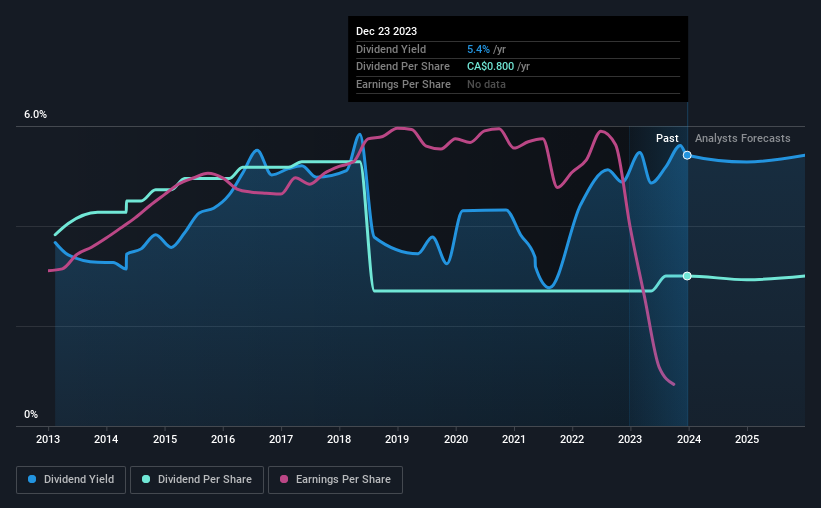Don't Buy CI Financial Corp. (TSE:CIX) For Its Next Dividend Without Doing These Checks
CI Financial Corp. (TSE:CIX) stock is about to trade ex-dividend in four days. Typically, the ex-dividend date is one business day before the record date which is the date on which a company determines the shareholders eligible to receive a dividend. The ex-dividend date is of consequence because whenever a stock is bought or sold, the trade takes at least two business day to settle. Accordingly, CI Financial investors that purchase the stock on or after the 28th of December will not receive the dividend, which will be paid on the 15th of January.
The company's next dividend payment will be CA$0.20 per share, on the back of last year when the company paid a total of CA$0.80 to shareholders. Looking at the last 12 months of distributions, CI Financial has a trailing yield of approximately 5.4% on its current stock price of CA$14.77. We love seeing companies pay a dividend, but it's also important to be sure that laying the golden eggs isn't going to kill our golden goose! That's why we should always check whether the dividend payments appear sustainable, and if the company is growing.
View our latest analysis for CI Financial
If a company pays out more in dividends than it earned, then the dividend might become unsustainable - hardly an ideal situation. Last year, CI Financial paid out 216% of its profit to shareholders in the form of dividends. This is not sustainable behaviour and requires a closer look on behalf of the purchaser.
When a company pays out a dividend that is not well covered by profits, the dividend is generally seen as more vulnerable to being cut.
Click here to see the company's payout ratio, plus analyst estimates of its future dividends.

Have Earnings And Dividends Been Growing?
Businesses with shrinking earnings are tricky from a dividend perspective. If earnings decline and the company is forced to cut its dividend, investors could watch the value of their investment go up in smoke. CI Financial's earnings per share have fallen at approximately 29% a year over the previous five years. Ultimately, when earnings per share decline, the size of the pie from which dividends can be paid, shrinks.
The main way most investors will assess a company's dividend prospects is by checking the historical rate of dividend growth. CI Financial's dividend payments per share have declined at 2.4% per year on average over the past 10 years, which is uninspiring. It's never nice to see earnings and dividends falling, but at least management has cut the dividend rather than potentially risk the company's health in an attempt to maintain it.
The Bottom Line
Should investors buy CI Financial for the upcoming dividend? Not only are earnings per share shrinking, but CI Financial is paying out a disconcertingly high percentage of its profit as dividends. It's not that we hate the business, but we feel that these characeristics are not desirable for investors seeking a reliable dividend stock to own for the long term. All things considered, we're not optimistic about its dividend prospects, and would be inclined to leave it on the shelf for now.
Although, if you're still interested in CI Financial and want to know more, you'll find it very useful to know what risks this stock faces. To that end, you should learn about the 4 warning signs we've spotted with CI Financial (including 1 which is a bit unpleasant).
If you're in the market for strong dividend payers, we recommend checking our selection of top dividend stocks.
Have feedback on this article? Concerned about the content? Get in touch with us directly. Alternatively, email editorial-team (at) simplywallst.com.
This article by Simply Wall St is general in nature. We provide commentary based on historical data and analyst forecasts only using an unbiased methodology and our articles are not intended to be financial advice. It does not constitute a recommendation to buy or sell any stock, and does not take account of your objectives, or your financial situation. We aim to bring you long-term focused analysis driven by fundamental data. Note that our analysis may not factor in the latest price-sensitive company announcements or qualitative material. Simply Wall St has no position in any stocks mentioned.
